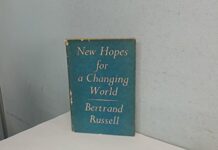
Ebook Info
- Published: 1998
- Number of pages: 272 pages
- Format: PDF
- File Size: 1.04 MB
- Authors: Bertrand Russell
Description
Russell on Ethics presents a coherent and comprehensive collection of Russell’s ethical writings, drawing on a wide range of his publications on ethical concerns, many of which have been difficult to access by students and general readers. Charles Pigden provides an accessible introduction to the papers, situating them within the field of ethics as a whole and detailed annotations on the papers themselves, analysing their arguments and exploring their relevance to current concerns. Russell on Ethics represents a valuable insight into Russell as an ethicist, which will be useful to both specialist and non-specialist alike.
User’s Reviews
Editorial Reviews: Review Excellent introduction notes by the editor. Required reading for students of Russell’s work’ – Network About the Author Charles Pidgin is a Senior Lecturer in the Department of Philosophy, University of Otago, New Zealand. He is the author of a number of papers on Bertrand Russell and on meta-ethics generally, including the chapter ‘Naturalism’ in Peter Singer’s prize winning A Companion to Ethics(Oxford 1991)
Reviews from Amazon users which were colected at the time this book was published on the website:
⭐Bertrand Russell saved my sanity when I was young and he’s still relevant in my senior years.
⭐Bought for my son because this philosopher was so formative to my thinking. I think everyone should at least be familiar with him. He speaks on the philosophy and morality of the issues of modern society.
⭐Russell was a sharp writer. This collection of essays co-authored and edited by Pigden is a great point to introduce ethics to an slightly more sophisticated audience.
⭐While I only agree with him about half the time, I have always had great respect for Bertrand Russell. As a philosopher, his prime interest was coming to the best reasoned conclusion, even if it meant ceding an argument, admitting error, or (publically) changing his mind. In my opinion, this truth-seeking-no-matter-what-the-consequences attitude is what made Russell so great and it is this quality that is on display in “Russell on Ethics.”As this book is quite chronological (still divided by subtopics within metaethics), we get to witness Russell’s evolution from Hegelian to Moorean to error theorist to (reluctant) emotivist. The fun comes in watching Russeel argue out of a position he argued FOR in a previous essay. Again, Russell was one of only a few philosophers with which I am aware (with Wittgenstein and Rawls) to publically change their mind about certain positions they have held. Seeing Russell do this is alone worth the price of the book.But for all of us emotivists (and those who dislike us!) there is another reason to read the book. Seeing Russell’s steady adoption of emotivism (in various forms) indirectly helps to explicate why emotivism is so appealing.First, we see Russell struggle to find some non-emotion-laden account of moral reasoning. But alas, moral reasoning always hangs on a (subjective) ‘ought’ rather than an (objective) ‘is.’ Thus, like Hume, Russell finally concluded that while reason can reason so long as an ‘is’ is in the picture, emotion is all that is left when ‘ought’ becomes the question.Next (but to a lesser degree) we see Russell ask another question: If ethics is in any way objective, then how do we explain the fact that there is so much moral disagreement? If a people are split on a moral issue 50/50 (or 25/25/25/25!), is it bettter to suppose (a) that 50% (or 75%!) are just wrong, or (b) that different people have different emotions on the matter that can neither be called right or wrong? Reluctantly, Russell graduallly chooses (b). (After all, if we call an emotional judgment ‘right’ or ‘wrong,’ then we have to base that judgment in some objective meta-standard and there is certainly no agreement on what THAT is!)Russell’s ambivalence towards emotivism (on the one hand seeing it as the best metaethical theory, but on the other, yearning for some objectivity in ethics), is another intersting thing to watch. It is intersting for a few reasons. First, it is indicative of the attitude Russell admirably brought towards philosophy: get the right answer, even if it is the one that doesn’t make you feel the best. (Undoubtedly, this is why he was so opposed to pragmatism.)It is also intersting because all of subjectivists/relativists (of any stripe, can identify with Russell’s ambivalence. No matter how convinced we are that relativism/subjectivism is the most accurate philosophy, all of us WISH it were not so. To paraphrase Russell, we might reason that “Torture/rape/etc. is wrong,” is a relative/subjective statement, but we still have the urge that it should be universal/objective. In all of us, as in Russell, there is that part of us that still believes in particular moral stances so much that, despite our philosophic selves, we can’t help seeing them as more than subjective preferences.In this, Russell is the very picture of honesty. Thus, Russell on Ethics is not only interesting from a meta-ethical standpoint, but also as a reminder of how philosophy should be done. Russell was clearly not afraid to listen to opposing ideas only to be swayed by them. Nor was he afraid to come to conclusions that, while not emotionally satisfying, were philosophically sound (only to be honest about how emotionally unsatisfying they are).In short, Russell on Ethics is a first-rate work of moral philosophy that, for once, doesn’t pretend to have the final word.
⭐Bertrand Russell (1872-1970) was one of the twentieth century’s most important philosophers and one of its best-known free thinkers. Raised in a religiously liberal home, Russell abandoned liberal Christianity early on seeking a “religion of reason.” Although he ultimately abandoned that as well, his views on religion remained complex.This collection of Russell’s writings on religious is organized by biographical accounts; religion and philosophy; religion and science; religion and morality; and religion and history. It contains most of Russell’s most important work on the subject, such as the famous essay “Why I Am Not a Christian.” I was disappointed however that it doesn’t contain his famous debate with Fr. Copleston.The introduction by Professors Greenspan and Andersson is excellent. The editors acknowledge the importance of Russell’s work in this area, but also his weakness as a historian of religion.
⭐I think “Bert” is a brilliant man and a terrific author, but most (if not all) of the essays in this book are really dry and uninteresting. The best part of the book was Bertrand’s discussion of what the word “should” means. He concludes that “should” in most instances mearly means that if you do x, someone specific would approve. For example, “you should be kind to others” means nothing more than “if you are kind to others, those people will experience a feeling of approval regarding your actions.” Other than that, the book was pretty painful to read. I recommend Why I Am Not A Christian or Unpopular Essays instead. I give this book 2 stars because nobody should ever give Bertrand Russell one star (if you did, he would disapprove!)
⭐Good book, low price, rapid delivery – thanks!
Keywords
Free Download Russell on Ethics: Selections from the Writings of Bertrand Russell in PDF format
Russell on Ethics: Selections from the Writings of Bertrand Russell PDF Free Download
Download Russell on Ethics: Selections from the Writings of Bertrand Russell 1998 PDF Free
Russell on Ethics: Selections from the Writings of Bertrand Russell 1998 PDF Free Download
Download Russell on Ethics: Selections from the Writings of Bertrand Russell PDF
Free Download Ebook Russell on Ethics: Selections from the Writings of Bertrand Russell





